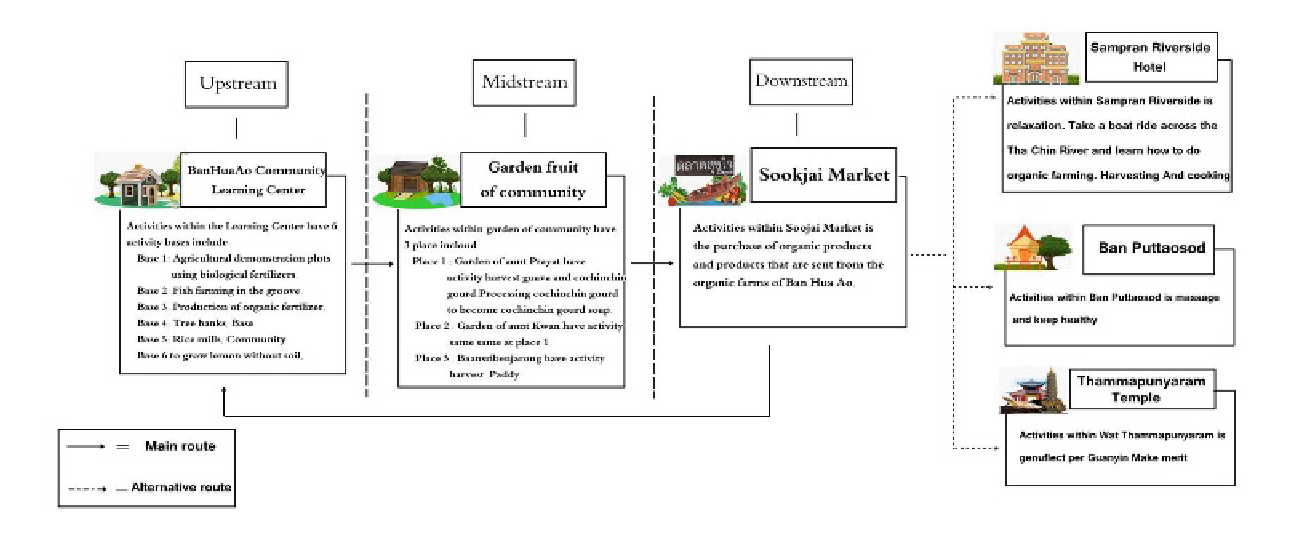The development of organic agrotourism route connection in Ban Hua Ao Community, Sam Phan District, Nakhon Pathom Province, to promote tourism potential
Main Article Content
Abstract
This study aimed to 1) study the tourism-related contexts of Ban Hua Ao Community in Nakhon Pathom Province, Thailand, and its connected areas, 2) study the agrotourism potential of Ban Hua Ao Community, and 3) develop connecting tourism routes for organic agrotourism according to the supply chain of organic products. This study adopted the method of qualitative research. Data were gathered by means of in-depth interviews with 20 people who were involved in Ban Hua Ao tourism. These people were divided into 5 groups: the community leaders, the local entrepreneurs, the residents, the public and private agencies, and the tourists. This study employed content analysis to analyze the data. The study found that Ban Hua Ao Community is known for its organic agricultural practice, which it uses to promote tourism. Ban Hua Ao Community shows great potential in all of the 5 respects of agrotourism potential. These are physical and biological landscape value; knowledge, wisdom and innovation value; tourism resource management potential; service potential; and potential to attract tourists. Finally it was found that the tourism route connection can be developed employing the concept of supply chain.
Article Details
References
The twelfth National Economic and Social Development Plan,2017–2021, Bangkok: Office of the national economic and so-cial development board, 2017.
Minitry of Tourism and Sport. Tourism development plan 2,Bangkok: Publishing house of the veterans administration atKing Prajadhipok’s lnstitute, 2017.
B. Jittanwattana, Tourism Industry, Bangkok: Thammasatprinting house, 2014.
J. M. Jenkins, C. M. Hall, The restructuring of rural economies:Rural tourism and recreation as a government response, in: R.W. Butler, C. M. Hall and J. M. Jenkins, Tourism and recreationin rural areas, New York: Wiley, 1998.
N. Chaisangpratip, The formats and operation of agro-tourism,Veridian E-Journal 3 (2014) 310 – 321.
T. Na Songkhla, Relationship between forms of agro-tourismactivities and usage of agricultural resources: A case studyof Changklag Agro-Tourism, Nakhon Si Thammarat Province,Managment and Information Science 2 (2011) 1 – 12.
S. Parnpeachra, Indigenous knowledge of organic agriculturein Chachoengsao province, Bangkok: Dhurakig Pundit Univer-sity, 2015.
Department of Tourism, Guide to quality assessment of agri-cultual tourism, Bangkok: Publishing house of the veterans ad-ministration at King Prajadhipok’s Institute, 2014.
J. J. Vogt, W. J. Pienaar, P. W. C. De Wit, Business LogisticsManagement: Theory and Practices, South Africa: Oxford Uni-versity Press, 2002.
R. Yodkeaw, et al., The study of potentiality and guideline foragrotourism development of Ban hua ao, Sam phran district,Nakhon Pathom Province, Bachelor’s degrees in arts, NakhonPathom: Nakhon Pathom Rajabhat University, 2017.
Ministry of Agriculture and Cooperatives, Logistics develop-ment stategy and supply chain agrilture sector, Planning Divi-sion, Department of Livestock Development, Available from:http://planning.dld.go.th/th/index.php/th/(accessed 16 August2018)
N. Pianroi, et al., Linking itinerary and tourism promotionprogram in the history and culture of the four provinces inSouthern Thailand, Journal of Management Sciences 32 (2015)89 – 115.


